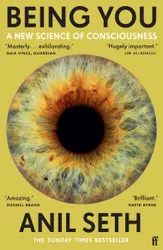The phenomenon of consciousness is a bit of a mystery. Why do I have this first-person point of view that seems to be centered in my own head? Why is there a feeling of what it’s like to be me? The more you think about it, the stranger it seems. This mystery has been called “the hard problem of consciousness”, and it seems like it would be impossible to ever figure out. Since consciousness is an experience that is only inside my own mind, how can I look at another person, or animal, or machine, and determine if they are also conscious? Let alone figure out why an entity is conscious, and how that comes about (without resorting to mystical explanations that don’t actually tell us anything).
This book, by neuroscientist Anil Seth, aims to side-step the so-called “hard problem of consciousness” with an alternative approach. The author makes an analogy between the hard problem of consciousness and early, misguided, attempts to understand life (another seemingly hard problem in earlier times) through some kind of life-force or vital substance. He explains that we came to understand much more about what life is by tackling it one problem at a time, until what seemed like a hard problem goes away in the light of understanding all the individual processes involved in a living organism. The book proposes that instead of solving the hard problem, we solve something called the “Real Problem of Consciousness”. This seems to mean breaking down the types of perceptions that a conscious being experiences, and attempting to understand how those come about through the senses and the brain. The hope is that all the smaller problems get solved, one at a time, leaving us with a good understanding and no hard problem remaining.
The book conveys the idea of a “controlled hallucination”. Because our brains are encased within our heads, and are only connected to the outside world through our senses, the model we have of the world “out there” is really an illusion; the model itself is only in our mind. Clearly, there is a world out there, and it matches our perceptions in many important ways; a totally inaccurate mental model wouldn’t help us to make the right decisions or improve the chances of survival. But what we perceive is really only our mental model, not reality itself.
The author’s argument is that many of the experiences of being conscious are the result of this mental model being maintained in the brain. This includes not only our perceptions of the world, but also our perceptions of our self as a being that persists through time. Is this enough to explain all the facets of being conscious? I’m not sure. It seems like it would be possible to build a computer system that maintains a similar set of mental models from sensory data and a history of self, but that computer system wouldn’t necessarily be conscious as a result. But this book’s approach is certainly a more satisfying explanation for how it feels to be conscious than I’ve read before.
The author also makes the case for animals being more conscious than we normally assume. He argues that we often confuse intelligence with consciousness. As humans, we are both intelligent and conscious, but it isn’t necessarily the case that the two must go together. For this reason, the book argues that we may make intelligent machines that can fool us into appearing to be conscious but which actually are not, and that many less intelligent animals are conscious already. There might be something it’s like to be a dog, or a bat, or even an ant. In the author’s view, the experience of being conscious is intimately connected to having a body, having senses and having goals as an entity (such as survival or reproduction) that require the use of a mental model and a sense of self. This naturally applies to most animals, but not (yet?) to artificial intelligences.
I really enjoyed this book. Thinking about consciousness is always pretty mind-bending. I like the approach of trying to break down the problem of understanding consciousness into smaller, more testable, hypotheses. Being You is really well written and explains its ideas really clearly, and it left me pondering the nature of my own consciousness for some time afterwards.
